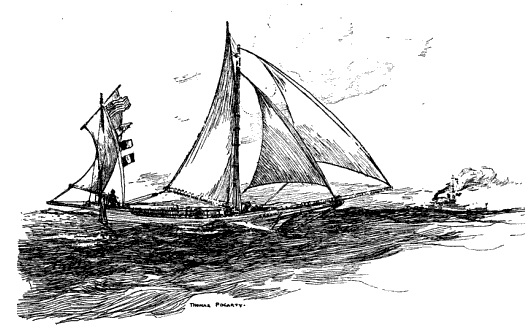

"On May 10 there was a great change in the condition of the sea; there
could be no doubt of my longitude now, if any had before existed in my
mind. Strange and long-forgotten current ripples pattered against the
sloop's sides in grateful music; the tune arrested the oar, and I sat
quietly listening to it while the SRPRAY kept on her course. By these
current ripples I was assured that she was now off St. Roque and had
struck the current which sweeps around that cape. The trade-winds, we
old sailors say, produce this current, which, in its course from this
point forward, is governed by the coastline of Brazil, Guiana,
Venezuela, and, as some would say, by the Monroe Doctrine.
The trades had been blowing fresh for some time, and the current, now at
its height, amounted to forty miles a day. This, added to the sloop's
run by the log, made the handsome day's work of one hundred and eighty
miles on several consecutive days, I saw nothing of the coast of Brazil,
though I was not many leagues off and was always in the Brazil current.
I did not know that war with Spain had been declared, and that I might
be liable, right there, to meet the enemy and be captured. Many had told
me at Cape Town that, in their opinion, war was inevitable, and they
said: "The Spaniard will get you! The Spaniard will get you!" To all
this I could only say that, even so, he would not get much. Even in the
fever-heat over the disaster to the MAINE I did
not think there would be war; but I am no politician. Indeed, I had
hardly given the matter a serious thought when, on the 14th of May, just
north of the equator, and near the longitude of the river Amazon, I saw
first a mast, with the Stars and Stripes floating from it, rising astern
as if poked up out of the sea, and then rapidly appearing on the
horizon, like a citadel, the OREGON! As she
came near I saw that the great ship was flying the signals "C B T,"
which read, "Are there any men-of-war about?" Right under these flags,
and larger than the SPRAY's mainsail, so it appeared, was the yellowest
Spanish flag I ever saw. It gave me nightmare some time after when I
reflected on it in my dreams.
I did not make out the OREGON's
signals till she passed ahead, where I could read them better, for she
was two miles away, and I had no binoculars. When I had read her flags I
hoisted the signal "No," for I had not seen any Spanish men-of-war; I
had not been looking for any. My final signal, "Let us keep together for
mutual protection," Captain Clark did not seem
to regard as necessary. Perhaps my small flags were not made out;
anyhow, the OREGON steamed on
with a rush, looking for Spanish men-of-war, as I learned afterward. The
OREGON's great flag was dipped
beautifully three times to the SPRAY's lowered flag as she passed on.
Both had crossed the line only a few hours before. I pondered long that
night over the probability of a war risk now coming upon the SPRAY after
she had cleared all, or nearly all, the dangers of the sea, but finally
a strong hope mastered my fears."